As highlighted in my earlier article, “Uniform Criminal Code” (11 December), we appear to be stuck in a time warp so far as the administration of the criminal justice system is concerned. Alarmingly, a far more deleterious trend is now in evidence in civil matters ~ action is taken by the authorities based solely on popular perception.
Take the instance of the two hospitals which were in the news recently. One of the hospitals apparently declared a living baby as dead leading to denial of timely treatment and eventual death of the baby. The parents and public were justifiably outraged and the Delhi Government cancelled the licence of the hospital. The other hospital, also in the NCR, presented a bill of around Rs 16 lakh for a hospital-stay of two weeks for a child who died of dengue. The Haryana government is in the process of cancelling the lease of this hospital. It would appear that government decisions in both cases were prompted by public anger.
Advertisement
It is no one’s case that sharp practices and overcharging by corporate hospitals is unknown to those in authority. In many cases, the violation of norms is manifest; most of the corporate hospitals were built on public land yet they refuse to offer free treatment to 25 per cent patients, extra beds sanctioned for patients of infectious diseases are used for accommodating other kinds of patients and so on. Medical negligence, though less common, is occasioned by the perception of patients by doctors solely as objects for earning profits. However, the government damages its credibility by taking precipitate action whenever politically convenient, but keeping silent otherwise.
One may ask what prevents the government from prescribing guidelines for treatment and billing in private hospitals? Why should not all hospitals be inspected instead of only the ones that stand indicted by the public? Avoiding knee-jerk responses, why doesn’t the Government establish an empowered body that can enforce healthy treatment and billing norms? Interestingly, it appears that hospital suppliers print an MRP which is many times the market price on items of common use. Hospitals charge the MRP from patients, paying the market price to suppliers, earning huge profits in the process. One is reminded of a similar racket in cinema halls, where a highly inflated MRP is printed on water bottles but one does expect better practices from hospitals. In its defence, the hospital has said that all hospitals bill patients in a similar manner, which only strengthens the case for a review of billing practices of all hospitals.
The decision to cancel the licences of both hospitals is sure to be challenged at all available forums. Till date, IMA and FICCI have emphatically come out in support of both the hospitals. Defending the accused hospitals, these bodies have said that a super-speciality hospital can only be set up after herculean efforts and gargantuan expenditure and it would be unfair to punish the hospitals for lapses of individual employees. Further, shutting down two super-speciality hospitals will definitely reduce the availability of medical care to the public.
A similar dilemma confronts authorities in the Ryan School case. Should a school be shut down and the academic careers of hundreds of students be jeopardised because the school did not follow prudent safety norms? This question assumes importance because similar instances have been reported in other schools in Delhi as well as also schools in places as far apart as Kolkata, Bengaluru and Mumbai. On the other hand, should we permit schools to treat the lives and persons of our children with carelessness?
Here, we the citizens, have an important role to play. Citizens would have to persuade the Government to lay down healthy norms for the running of schools and hospitals. Regulatory bodies with citizen-representation, which constantly monitor the operations of the institutions under their charge, need to be set up. Systems which promote safety and fairness should be set in place. We would have to be unceasingly vigilant to prevent recurrence of similar unseemly episodes at schools and hospitals. The emphasis should be on prevention rather than punishment.
Instead of ad hoc punishments a graded response to shortcomings should be evolved. For example, gaps in safety should be rectified at the institution’s cost. Offences like overbilling should attract hefty fines. If we have definite norms in place, the hospital administration could be made responsible for medical negligence and not individual doctors or staff, which would definitely reduce the cases of negligence. Instead of being closed down, the management of recalcitrant institutions can be taken over.
Of course, to enforce this regime we would have to let go of the belief that doctors and teachers follow a higher calling and are somehow different from ordinary mortals. We have to acknowledge that corporates, even if they are hospitals or schools have profit maximisation as their goal and have to be regulated in the manner we regulate other kinds of businesses. Presently, the clientele of corporate hospitals primarily consists of foreigners, persons covered by insurance and the really rich ~ who do not mind indiscriminate billing by the hospitals.
The aura around corporate hospitals is such that only very rarely does someone dare question their doings. Same is the case with high-end schools; parents consider themselves lucky if their children get admission and are more than willing to accede to the schools’ just and unjust demands. The sight of these institutions on the wrong side of law has warmed the hearts of the public but it must be remembered that “An eye for an eye, a tooth for a tooth” was the concept of justice in primitive societies. At the present moment, it would be much better if we regulate the working of such institutions in a manner that they carry on their operations not for their own benefit alone but for the benefit of the society at large.
The writer is a retired Chief Commissioner of Income-Tax











